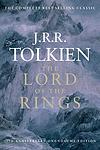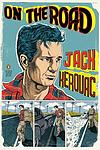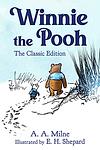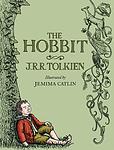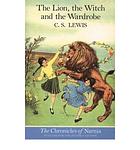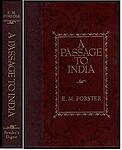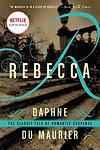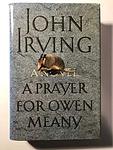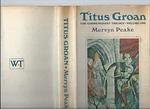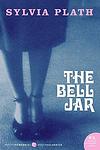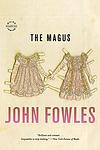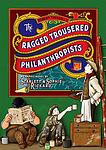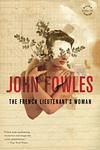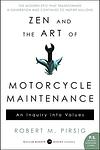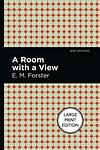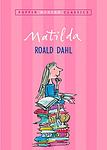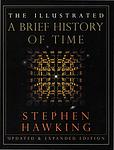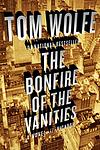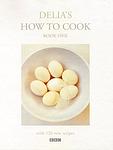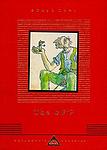Waterstone's Books of the Century
This is one of the 284 lists we use to generate our main The Greatest Books list.
-
The Lord of the Rings by J. R. R. Tolkien
This epic high-fantasy novel centers around a modest hobbit who is entrusted with the task of destroying a powerful ring that could enable the dark lord to conquer the world. Accompanied by a diverse group of companions, the hobbit embarks on a perilous journey across Middle-earth, battling evil forces and facing numerous challenges. The narrative, rich in mythology and complex themes of good versus evil, friendship, and heroism, has had a profound influence on the fantasy genre.
-
Nineteen Eighty Four by George Orwell
Set in a dystopian future, the novel presents a society under the total control of a totalitarian regime, led by the omnipresent Big Brother. The protagonist, a low-ranking member of 'the Party', begins to question the regime and falls in love with a woman, an act of rebellion in a world where independent thought, dissent, and love are prohibited. The novel explores themes of surveillance, censorship, and the manipulation of truth.
-
Animal Farm by George Orwell
"Animal Farm" is a satirical fable set on a farm where the animals revolt, overthrow their human farmer, and take over the running of the farm for themselves. The story is an allegory of the Russian Revolution and the rise of Stalin, and the tale is told by the animals that inhabit the farm, primarily pigs who become the ruling class. Despite their initial attempts at creating an equal society, corruption and power ultimately lead to a regime as oppressive as the one they overthrew.
-
Ulysses by James Joyce
Set in Dublin, the novel follows a day in the life of Leopold Bloom, an advertising salesman, as he navigates the city. The narrative, heavily influenced by Homer's Odyssey, explores themes of identity, heroism, and the complexities of everyday life. It is renowned for its stream-of-consciousness style and complex structure, making it a challenging but rewarding read.
-
Catch-22 by Joseph Heller
The book is a satirical critique of military bureaucracy and the illogical nature of war, set during World War II. The story follows a U.S. Army Air Forces B-25 bombardier stationed in Italy, who is trying to maintain his sanity while fulfilling his service requirements so that he can go home. The novel explores the absurdity of war and military life through the experiences of the protagonist, who discovers that a bureaucratic rule, the "Catch-22", makes it impossible for him to escape his dangerous situation. The more he tries to avoid his military assignments, the deeper he gets sucked into the irrational world of military rule.
-
The Catcher in the Rye by J. D. Salinger
The novel follows the story of a teenager named Holden Caulfield, who has just been expelled from his prep school. The narrative unfolds over the course of three days, during which Holden experiences various forms of alienation and his mental state continues to unravel. He criticizes the adult world as "phony" and struggles with his own transition into adulthood. The book is a profound exploration of teenage rebellion, alienation, and the loss of innocence.
-
To Kill a Mockingbird by Harper Lee
Set in the racially charged South during the Depression, the novel follows a young girl and her older brother as they navigate their small town's societal norms and prejudices. Their father, a lawyer, is appointed to defend a black man falsely accused of raping a white woman, forcing the children to confront the harsh realities of racism and injustice. The story explores themes of morality, innocence, and the loss of innocence through the eyes of the young protagonists.
-
One Hundred Years of Solitude by Gabriel Garcia Marquez
This novel is a multi-generational saga that focuses on the Buendía family, who founded the fictional town of Macondo. It explores themes of love, loss, family, and the cyclical nature of history. The story is filled with magical realism, blending the supernatural with the ordinary, as it chronicles the family's experiences, including civil war, marriages, births, and deaths. The book is renowned for its narrative style and its exploration of solitude, fate, and the inevitability of repetition in history.
-
The Grapes of Wrath by John Steinbeck
The book follows the Joad family, Oklahoma farmers displaced from their land during the Great Depression. The family, alongside thousands of other "Okies," travel to California in search of work and a better life. Throughout their journey, they face numerous hardships and injustices, yet maintain their humanity through unity and shared sacrifice. The narrative explores themes of man's inhumanity to man, the dignity of wrath, and the power of family and friendship, offering a stark and moving portrayal of the harsh realities of American migrant laborers during the 1930s.
-
Trainspotting by Irvine Welsh
This novel is a gritty, raw portrayal of a group of heroin addicts living in Edinburgh, Scotland. The narrative is non-linear and told from multiple perspectives, providing a deep dive into the minds and lives of these characters. The story explores themes of poverty, addiction, friendship, and the struggle to escape one's circumstances, all set against the backdrop of a bleak urban landscape. It is known for its strong Scottish dialect, graphic content, and dark humor.
-
Wild Swans: Three Daughters of China by Jung Chang
This book is a biographical account of three generations of women in China, spanning the years 1909 to 1991. The narrative follows the lives of the author's grandmother, a warlord's concubine; her mother, a high-ranking official in the Communist Party; and the author herself, who grew up during the Cultural Revolution before moving to the West. The book presents a vivid portrayal of the political and social changes in China during the 20th century, as seen through the eyes of these three women.
-
The Great Gatsby by F. Scott Fitzgerald
Set in the summer of 1922, the novel follows the life of a young and mysterious millionaire, his extravagant lifestyle in Long Island, and his obsessive love for a beautiful former debutante. As the story unfolds, the millionaire's dark secrets and the corrupt reality of the American dream during the Jazz Age are revealed. The narrative is a critique of the hedonistic excess and moral decay of the era, ultimately leading to tragic consequences.
-
Lord of the Flies by William Golding
A group of British boys are stranded on an uninhabited island after their plane crashes during wartime. Initially, they attempt to establish order, creating rules and electing a leader. However, as time passes, their civility erodes, and they descend into savagery and chaos. The struggle for power intensifies, leading to violence and death. The novel explores themes of innocence, the inherent evil in mankind, and the thin veneer of civilization.
-
On the Road by Jack Kerouac
This novel follows the story of a young man and his friend as they embark on a series of cross-country road trips across America during the late 1940s and early 1950s. The protagonist, driven by a desire for freedom and a quest for identity, encounters a series of eccentric characters and experiences the highs and lows of the Beat Generation. The narrative is a testament to the restlessness of youth and the allure of adventure, underscored by themes of jazz, poetry, and drug use.
-
Brave New World by Aldous Huxley
Set in a dystopian future, the novel explores a society where human beings are genetically bred and pharmaceutically conditioned to serve in a ruling order. The society is divided into five castes, each with its specific roles. The narrative follows a savage who rejects the norms of this new world order and struggles to navigate the clash between the values of his upbringing and the reality of this technologically advanced, emotionless society. His resistance prompts a deep examination of the nature of freedom, individuality, and happiness.
-
The Wind in the Willows by Kenneth Grahame
"The Wind in the Willows" is a charming tale about the adventures of four anthropomorphic animal friends - Mole, Rat, Badger, and the rebellious and extravagant Toad. The story is set in the idyllic English countryside and explores themes of friendship, exploration, and respect for nature. The narrative is marked by Toad's reckless behavior, his obsession with motor cars, and his eventual redemption. The other characters, with their contrasting personalities, bring balance and depth to the story.
-
Winnie the Pooh by A. A Milne
This classic children's tale follows the charming adventures of a lovable, honey-loving bear named Winnie the Pooh and his friends in the Hundred Acre Wood. With his companions, including the timid Piglet, the gloomy Eeyore, the energetic Tigger, and the wise Owl, Pooh navigates through various situations and dilemmas, often with humorous and heartwarming results. The book is a celebration of friendship, imagination, and the simple joys of life.
-
The Color Purple by Alice Walker
Set in the early 20th century, the novel is an epistolary tale of a young African-American woman named Celie, living in the South. She faces constant abuse and hardship, first from her father and then from her husband. The story unfolds through her letters written to God and her sister Nettie, revealing her emotional journey from oppression to self-discovery and independence, aided by her relationships with strong women around her. The narrative explores themes of racism, sexism, domestic violence, and the power of sisterhood and love.
-
The Hobbit by J. R. R. Tolkien
In this fantasy novel, a timid and unadventurous hobbit named Bilbo Baggins is whisked away on a grand adventure by a wizard and a group of dwarves. Their mission is to reclaim the dwarves' homeland and treasure from a fearsome dragon. Throughout the journey, Bilbo grows in courage and cunning, proving himself a true hero as he encounters trolls, goblins, giant spiders, and other perils. The novel culminates with a great battle involving various races of Middle Earth, after which Bilbo returns home, forever changed by his experiences.
-
The Stranger by Albert Camus
The narrative follows a man who, after the death of his mother, falls into a routine of indifference and emotional detachment, leading him to commit an act of violence on a sun-drenched beach. His subsequent trial becomes less about the act itself and more about his inability to conform to societal norms and expectations, ultimately exploring themes of existentialism, absurdism, and the human condition.
-
The Trial by Franz Kafka
The book revolves around a bank clerk who wakes one morning to find himself under arrest for an unspecified crime. Despite not being detained, he is subjected to the psychological torment of a bizarre and nightmarish judicial process. The story is a critique of bureaucracy, exploring themes of guilt, alienation and the inefficiency of the justice system.
-
The Lion, The Witch and the Wardrobe by C. S. Lewis
Four siblings are evacuated from London during World War II and sent to live with an old professor in the countryside. In his house, they discover a magical wardrobe that serves as a portal to the land of Narnia, a world filled with mythical creatures and ruled by an evil White Witch. The children are soon caught up in a struggle to free Narnia from the witch's eternal winter, aided by the majestic lion Aslan. The story combines elements of fantasy, adventure, and Christian allegory.
-
Gone With the Wind by Margaret Mitchell
Set against the backdrop of the American Civil War and Reconstruction era, this novel follows the life of a young Southern belle, who is known for her beauty and charm. Her life takes a turn when she is forced to make drastic changes to survive the war and its aftermath. The story revolves around her struggle to maintain her family's plantation and her complicated love life, especially her unrequited love for a married man, and her tumultuous relationship with a roguish blockade runner.
-
The Hitchhiker's Guide to the Galaxy by Douglas Adams
This comedic science fiction novel follows the intergalactic adventures of an unwitting human, Arthur Dent, who is rescued just before Earth's destruction by his friend Ford Prefect, a researcher for a galactic travel guide. Together, they hitch a ride on a stolen spaceship, encountering a range of bizarre characters, including a depressed robot and a two-headed ex-president of the galaxy. Through a series of satirical and absurd escapades, the book explores themes of existentialism, bureaucracy, and the absurdity of life, all while poking fun at the science fiction genre and offering witty commentary on the human condition.
-
Midnight's Children by Salman Rushdie
The novel tells the story of Saleem Sinai, who was born at the exact moment when India gained its independence. As a result, he shares a mystical connection with other children born at the same time, all of whom possess unique, magical abilities. As Saleem grows up, his life mirrors the political and cultural changes happening in his country, from the partition of India and Pakistan, to the Bangladesh War of Independence. The story is a blend of historical fiction and magical realism, exploring themes of identity, fate, and the power of storytelling.
-
The Diary of a Young Girl by Anne Frank
This book is a real-life account of a young Jewish girl hiding from the Nazis during World War II, written in diary format. The girl and her family are forced to live in a secret annex in Amsterdam for two years, during which she writes about her experiences, fears, dreams, and the onset of adolescence. The diary provides a poignant and deeply personal insight into the horrors of the Holocaust, making it a powerful testament to the human spirit.
-
A Clockwork Orange by Anthony Burgess
This novel follows the life of a violent young man named Alex, who is part of a youth subculture in a dystopian future England. Alex and his gang engage in a nightmarish spree of rape, assault, and robbery, until he is arrested and subjected to a psychological experiment by the government to "cure" him of his violent tendencies. The novel explores themes of free will, morality, and the nature of evil, while using a unique slang language invented by the author.
-
Sons and Lovers by D. H. Lawrence
"Sons and Lovers" is a semi-autobiographical novel that explores the complex relationships between a miner's wife, her husband, and their two sons. The story focuses on the intense emotional and psychological bonds between the mother and her sons, as well as the struggles they face in their romantic relationships due to their deep attachment to their mother. The novel delves into themes of class, love, sexuality, and the oedipal complex, presenting a vivid picture of working-class life in early 20th century England.
-
To the Lighthouse by Virginia Woolf
This novel is a pioneering work of modernist literature that explores the Ramsay family's experiences at their summer home on the Isle of Skye in Scotland. The narrative is divided into three sections, focusing on a day in the family's life, a description of the house during their absence, and their return after ten years. The book is known for its stream of consciousness narrative technique and its exploration of topics such as the passage of time, the nature of art, and the female experience.
-
Survival In Auschwitz by Primo Levi
This book is a harrowing, first-person account of a man's year-long ordeal in Auschwitz, the infamous Nazi concentration camp. The narrative details the brutal conditions, the dehumanizing treatment, and the constant struggle for survival. Despite the horrors he faces, the author emphasizes the importance of maintaining one's humanity and dignity, even in the face of unimaginable cruelty. The book serves as a poignant reminder of the depths of human depravity, as well as the resilience of the human spirit.
-
Lolita by Vladimir Nabokov
The novel tells the story of Humbert Humbert, a man with a disturbing obsession for young girls, or "nymphets" as he calls them. His obsession leads him to engage in a manipulative and destructive relationship with his 12-year-old stepdaughter, Lolita. The narrative is a controversial exploration of manipulation, obsession, and unreliable narration, as Humbert attempts to justify his actions and feelings throughout the story.
-
The Wasp Factory: A Novel by Iain Banks
The novel is a dark and disturbing tale of a 16-year-old boy named Frank who lives on a secluded island with his eccentric father. Frank, who has killed three children in his past, spends his time engaging in violent rituals and maintaining his "Wasp Factory," a barbaric contraption he uses for divination. The narrative takes a turn when his older brother, who is institutionalized, escapes and heads home, leading to shocking revelations about their family's past and Frank's identity.
-
In Search of Lost Time by Marcel Proust
This renowned novel is a sweeping exploration of memory, love, art, and the passage of time, told through the narrator's recollections of his childhood and experiences into adulthood in the late 19th and early 20th century aristocratic France. The narrative is notable for its lengthy and intricate involuntary memory episodes, the most famous being the "madeleine episode". It explores the themes of time, space and memory, but also raises questions about the nature of art and literature, and the complex relationships between love, sexuality, and possession.
-
Charlie And The Chocolate Factory, by Roald Dahl
A young boy named Charlie lives in poverty and dreams of visiting the nearby chocolate factory owned by the eccentric and mysterious Willy Wonka. When Charlie finds one of the five golden tickets hidden in chocolate bars worldwide, he earns the chance to tour the factory. Accompanied by his Grandpa Joe and four other children, Charlie embarks on a magical and surreal adventure inside the factory, where he learns valuable lessons about greed, arrogance, and honesty.
-
Of Mice and Men by John Steinbeck
The book is a tragic tale of two displaced ranch workers during the Great Depression in California. The two main characters, an intelligent but uneducated man and his mentally disabled companion, dream of owning their own piece of land. However, their dreams are thwarted by circumstances beyond their control, leading to a heart-wrenching conclusion. The book explores themes of friendship, dreams, loneliness, and the harsh realities of the American Dream.
-
Beloved by Toni Morrison
This novel tells the story of a former African-American slave woman who, after escaping to Ohio, is haunted by the ghost of her deceased daughter. The protagonist is forced to confront her repressed memories and the horrific realities of her past, including the desperate act she committed to protect her children from a life of slavery. The narrative is a poignant exploration of the physical, emotional, and psychological scars inflicted by the institution of slavery, and the struggle for identity and self-acceptance in its aftermath.
-
Possession by A. S. Byatt
"Possession" is a novel that interweaves two storylines, one set in contemporary times and the other in the Victorian era. The contemporary plot follows two academics who uncover a secret love affair between two 19th-century poets, while the Victorian storyline presents the clandestine romance itself. As the modern scholars delve deeper into the past, they find themselves falling in love as well, mirroring the historical romance they are researching. The book explores themes of love, passion, and the power of the written word.
-
Heart of Darkness by Joseph Conrad
This classic novel follows the journey of a seaman who travels up the Congo River into the African interior to meet a mysterious ivory trader. Throughout his journey, he encounters the harsh realities of imperialism, the brutal treatment of native Africans, and the depths of human cruelty and madness. The protagonist's journey into the 'heart of darkness' serves as both a physical exploration of the African continent and a metaphorical exploration into the depths of human nature.
-
A Passage to India by E. M. Forster
The novel takes place in British-ruled India, where the cultural divide between the British and the Indians is explored. The story focuses on the experiences of an Indian Muslim, Dr. Aziz, and his interactions with an English woman, Miss Quested, and her elderly friend, Mrs. Moore. After an expedition to the Marabar Caves, Miss Quested accuses Dr. Aziz of assault, leading to a trial that deepens the racial tensions and prejudices between the colonizers and the colonized. The novel is a critique of British imperialism and a study of the cultural and racial misunderstandings and ill-will between the British and the Indian people.
-
Watership Down by Richard Adams
This novel follows a group of rabbits as they flee their warren due to a foreseen catastrophe. The rabbits, led by Hazel and his psychic brother Fiver, face numerous challenges and adventures as they search for a new home. They encounter predators, hostile rabbit communities, and human threats. The book explores themes of leadership, survival, and freedom, all set within the natural world and its inherent dangers.
-
Sophie's World: A Novel About the History of Philosophy by Jostein Gaarder
"Sophie's World" is a unique and intriguing novel that intertwines the narrative of a young girl named Sophie with a comprehensive history of Western philosophy. Sophie begins receiving mysterious letters from an unknown philosopher and gradually becomes engrossed in the world of philosophy. The book uses Sophie's journey to explore philosophical concepts and theories, from ancient to modern times, in an accessible and engaging way, making it an excellent introduction to the subject for readers of all ages.
-
The Name of the Rose by Umberto Eco
Set in a wealthy Italian monastery in the 14th century, the novel follows a Franciscan friar and his young apprentice as they investigate a series of mysterious deaths within the monastery. As they navigate the labyrinthine library and decipher cryptic manuscripts, they uncover a complex plot involving forbidden books, secret societies, and the Inquisition. The novel is a blend of historical fiction, mystery, and philosophical exploration, delving into themes of truth, knowledge, and the power of the written word.
-
Love in the Time of Cholera by Gabriel Garcia Marquez
This novel follows the story of Florentino Ariza and Fermina Daza, who fall passionately in love in their youth. However, Fermina eventually marries a wealthy doctor, leaving Florentino heartbroken. Despite this, Florentino remains devoted to Fermina for over fifty years, patiently waiting for her husband's death to have another chance at her love. The story is set against the backdrop of a cholera epidemic, serving as a metaphor for the transformative power of love and the destructive power of obsession.
-
Rebecca by Daphne du Maurier
A young woman marries a wealthy widower and moves into his large English country house. She quickly realizes that the memory of her husband's first wife, Rebecca, haunts every corner of the estate. The housekeeper's obsessive devotion to Rebecca and the mysterious circumstances of her death continue to overshadow the second wife's attempts to make a happy life with her husband. As secrets about Rebecca's life and death are revealed, the new wife must grapple with her own identity and place within the household.
-
The Remains of the Day by Kazuo Ishiguro
The novel is a poignant tale of an English butler, Stevens, who reflects on his life and career during a road trip through the English countryside. As he delves into his past, he reveals his unquestioning loyalty to his former employer, Lord Darlington, and his unexpressed love for the housekeeper, Miss Kenton. The narrative explores themes of dignity, duty, and regret, as Stevens comes to terms with his unquestioning devotion to his employer and the missed opportunities in his personal life.
-
The Unbearable Lightness of Being by Milan Kundera
Set against the backdrop of the Prague Spring period of Czechoslovak history, the novel explores the philosophical concept of Nietzsche's eternal return through the intertwined lives of four characters: a womanizing surgeon, his intellectual wife, his naïve mistress, and her stoic lover. The narrative delves into their personal struggles with lightness and heaviness, freedom and fate, love and betrayal, and the complexities of human relationships, all while offering a profound meditation on the nature of existence and the paradoxes of life.
-
Birdsong by Sebastian Faulks
"Birdsong" is a historical novel that explores the horrors of World War I through the eyes of Stephen Wraysford, a young Englishman. The narrative alternates between Stephen's passionate love affair with a married woman in pre-war France and his experiences in the trenches of the Western Front. The novel also includes a subplot set in the 1970s, where Stephen's granddaughter tries to unravel the mystery of her grandfather's past. The book is a poignant exploration of love, war, and the endurance of the human spirit.
-
Howards End by E. M. Forster
This novel explores class relations and conflicting values in turn-of-the-century England. The narrative revolves around three families: the wealthy, capitalist Wilcoxes; the cultured, idealistic Schlegels; and the lower-middle class Basts. As their lives intertwine, the story grapples with themes of wealth, love, and death, and the struggle for personal connection in an increasingly impersonal society. The titular "Howards End" is a country home, and it becomes a symbol of England's past, present, and future.
-
Brideshead Revisited by Evelyn Waugh
The novel is a nostalgic story about the narrator's involvement with the Flyte family, British aristocrats living in a grand mansion called Brideshead. The story explores themes of faith, love, and the decline of the British aristocracy, primarily through the narrator's relationships with the family's Catholic faith and his complicated friendship with the family's son and his love for the daughter. The novel is set in the backdrop of the time period between the two World Wars.
-
A Suitable Boy by Vikram Seth
Set in 1950s India, this epic novel follows the story of four families over a period of 18 months, focusing primarily on the young woman Lata and her mother's quest to find her a suitable husband. The narrative explores the political, social, and personal upheavals in a newly independent India, struggling with its own identity amidst the backdrop of a society grappling with religious tensions, land reforms, and the shaping of a modern democratic state. Lata's journey is an exploration of love, ambition, and the weight of familial duty.
-
Dune by Frank Herbert
Set in a distant future, the novel follows Paul Atreides, whose family assumes control of the desert planet Arrakis. As the only producer of a highly valuable resource, jurisdiction over Arrakis is contested among competing noble families. After Paul and his family are betrayed, the story explores themes of politics, religion, and man’s relationship to nature, as Paul leads a rebellion to restore his family's reign.
-
A Prayer for Owen Meany by John Irving
The book is a tale of two childhood friends, one of whom believes he is God's instrument. The story is set in a New England town during the 1950s and 1960s and follows the lives of the two boys, one small and with a strange voice, who has visions of his own death and believes he is an instrument of God, and the other, the narrator, who struggles with faith. The novel explores themes of faith, fate, and the power of friendship against a backdrop of historical and political events, including the Vietnam War.
-
Perfume by Patrick Suskind
Set in 18th-century France, this novel tells the story of Jean-Baptiste Grenouille, a man born with an extraordinary sense of smell but no personal scent of his own. He becomes an apprentice to a prominent perfumer and learns to create the world's most intoxicating perfumes. However, his obsession with capturing the perfect scent leads him down a dark path, as he begins to kill young women to extract their scent. The book is a chilling exploration of obsession, identity, and the power of scent.
-
Doctor Zhivago by Boris Pasternak
Set against the tumultuous backdrop of the Russian Revolution, the book follows the life of a physician and poet, Yuri Zhivago, as he navigates the political and social upheaval of the early 20th century. Torn between his love for two women, his wife Tonya and his passionate mistress Lara, Zhivago's personal struggles mirror the larger societal changes occurring around him. The novel explores themes of love, war, and the human spirit, offering a poignant and complex portrait of life during a time of revolutionary change.
-
Titus Alone by Mervyn Peake
"Titus Alone" is the third book in a series where the protagonist, Titus Groan, leaves his ancestral home, Gormenghast, to explore the world beyond. He stumbles upon a technologically advanced city, a stark contrast to his gothic homeland, and faces a series of adventures and challenges. The book delves into themes of identity, belonging, and the clash of tradition versus modernity, as Titus grapples with his past and uncertain future.
-
Titus Groan by Mervyn Peake
The novel is a gothic fantasy set in the bizarre and intricate world of Gormenghast Castle, home to the ancient and eccentric Groan family. The story begins with the birth of Titus Groan, the seventy-seventh Earl, who stands to inherit the castle and its strange traditions. The narrative follows the castle's eccentric characters and their bizarre rituals, including the ambitious kitchen boy, Steerpike, who seeks to manipulate the castle's traditions for his own gain. It's a dark and surreal exploration of ritual, power, and madness.
-
Gormenghast by Mervyn Peake
Set in a vast, crumbling castle named Gormenghast, the story follows the life of Titus Groan, the heir to the Earl of Groan. The narrative explores the complex, rigidly structured society within the castle and the struggles and intrigues of its eccentric characters, particularly the scheming kitchen boy Steerpike. As Titus grows older, he begins to rebel against the stifling traditions of Gormenghast, setting the stage for a dramatic clash between the old and the new.
-
Cider with Rosie by Laurie Lee
"Cider with Rosie" is a memoir that captures the experiences of a young boy growing up in a small Cotswold village in England during the early 20th century. The narrative vividly portrays the simplicity and beauty of rural life, while also exploring the complexities of adolescence and first love. It is a nostalgic and evocative account of a bygone era, filled with memorable characters and richly detailed descriptions of the natural world.
-
The Bell Jar by Sylvia Plath
The novel follows the story of a young woman who wins a guest editorship at a magazine in New York City and, after a series of personal and professional disappointments, suffers a mental breakdown and returns to her family, where she continues to struggle with depression and suicidal thoughts. The protagonist's experiences in psychiatric institutions and her attempts to reclaim her life are depicted with brutal honesty, making it a poignant exploration of mental illness and the societal pressures faced by women in the mid-20th century.
-
The Handmaid's Tale by Margaret Atwood
Set in a dystopian future, this novel presents a society where women are stripped of their rights and are classified into various roles based on their fertility and societal status. The protagonist is a handmaid, a class of women used solely for their reproductive capabilities by the ruling class. The story is a chilling exploration of the extreme end of misogyny, where women are reduced to their biological functions, and a critique of religious fundamentalism.
-
Testament Of Youth by Vera Brittain
Testament of Youth is a poignant memoir detailing the author's experiences during World War I. The narrative follows her journey from her early life, her time as a Voluntary Aid Detachment nurse serving in London, Malta, and France, and her later years as a writer and pacifist. The author's personal loss, including the death of her fiancé and her brother, and the impact of the war on her generation, is a central theme, offering a unique female perspective on the devastating effects of war.
-
The Magus by John Fowles
The novel is a psychological drama that follows a young Englishman, Nicholas Urfe, who takes a teaching post on a remote Greek island to escape his dull life and a failed relationship. There, he meets a wealthy, mysterious man who introduces him to psychological games that blend myth, reality, and illusion. As Nicholas falls deeper into these manipulative scenarios, he begins to question his own sanity and reality. The story is filled with existential themes, exploring the nature of personal freedom, love, and the blurred line between reality and fantasy.
-
Brighton Rock by Graham Greene
"Brighton Rock" is a thrilling crime novel set in 1930s Brighton, revolving around the life of a young gangster, who is involved in a series of violent acts and murders. The narrative also explores the themes of Catholicism, morality, and the nature of sin, as the protagonist struggles with his religious beliefs and the guilt of his actions. The story is further complicated by the involvement of a naive young woman who falls in love with the gangster, unaware of his dark side.
-
The Ragged Trousered Philanthropists by Robert Tressell, Peter Miles
"The Ragged Trousered Philanthropists" is a semi-autobiographical novel that explores the lives of a group of working men in the fictional town of Mugsborough, and their struggle to survive in a society marred by poverty and exploitation. The story primarily focuses on a socialist protagonist who endeavors to enlighten his fellow workers about capitalism's inherent flaws and the necessity for social change, all while battling the dire conditions of his own life. The novel is a critique of capitalism and a call for a socialist revolution.
-
The Master and Margarita by Mikhail Bulgakov
This novel is a complex narrative that weaves together three distinct yet intertwined stories. The first story is set in 1930s Moscow and follows the devil and his entourage as they wreak havoc on the city's literary elite. The second story is a historical narrative about Pontius Pilate and his role in the crucifixion of Jesus Christ. The third story is a love story between the titular Master, a writer who has been driven to madness by the criticism of his work, and his devoted lover, Margarita. The novel is a satirical critique of Soviet society, particularly the literary establishment, and its treatment of artists. It also explores themes of love, sacrifice, and the nature of good and evil.
-
Tales of the City by Armistead Maupin
"Tales of the City" is a collection of interconnected stories set in 1970s San Francisco, focusing on the lives and experiences of a diverse group of residents living in the same apartment complex. The narrative explores various themes such as love, friendship, sexuality, and identity, providing a vivid snapshot of life in this iconic city during a transformative period of social change. The book is known for its candid portrayal of LGBTQ+ characters and issues, a groundbreaking approach at the time of its publication.
-
The French Lieutenant's Woman by John Fowles
Set in the Victorian era, the story revolves around a complex love triangle involving a gentleman engaged to a well-bred woman and his infatuation with a mysterious woman known as the French Lieutenant's Woman. This woman, shrouded in scandal and mystery, challenges the protagonist's conventional views of society and morality. The novel, known for its metafictional style, explores themes of freedom, responsibility, and the oppressive social norms of the time.
-
Corelli's Mandolin by Louis de Bernières
Set on the Greek island of Cephalonia during World War II, this novel explores the lives of the island's inhabitants as they experience the war's harsh realities. The narrative primarily focuses on the love story between a local woman and an Italian captain, who is part of the occupying forces. As the war progresses, the characters are forced to confront their beliefs, their relationships, and their identities, all while grappling with the devastating impacts of the conflict.
-
Slaughterhouse-Five by Kurt Vonnegut
The novel follows the life of Billy Pilgrim, a World War II veteran who has become "unstuck in time," experiencing his life events out of order. This includes his experiences as a prisoner of war in Dresden during the Allies' firebombing, his post-war life as a successful optometrist, his abduction by aliens from the planet Tralfamadore, and his eventual death. The book is a critique of war and a demonstration of the destructive nature of time, with a nonlinear narrative that reflects the chaos and unpredictability of life.
-
Zen and the Art of Motorcycle Maintenance by Robert M. Pirsig
The book is a philosophical novel that explores the protagonist's journey across the United States on a motorcycle with his son, during which he delves into questions about life, philosophy, and the nature of "Quality". The narrative is interspersed with flashbacks to the protagonist's life before the journey, including his time as a university professor and his struggle with mental illness. The book aims to reconcile the dichotomy between classical and romantic understandings of the world, ultimately arguing for a holistic approach that integrates both perspectives.
-
A Room With a View by E. M. Forster
Set in Italy and England, the novel tells the story of a young English woman, Lucy Honeychurch, who travels to Florence with her older cousin and chaperone. During her stay in Italy, Lucy meets and falls in love with a free-spirited man, but due to societal pressures, she becomes engaged to a wealthy but pretentious man back home in England. The novel explores themes of societal norms, personal growth, and the struggle between heart and mind as Lucy must decide between conforming to societal expectations or following her own desires.
-
Lucky Jim by Kingsley Amis
"Lucky Jim" is a comic novel that follows the life of Jim Dixon, a young and disillusioned lecturer at a provincial British university. Struggling with his job and his pretentious boss, Dixon navigates through a series of humorous and often absurd situations, including a disastrous public lecture and a chaotic weekend at his boss's house. The novel satirizes the snobbishness and hypocrisy of the academic world, and explores themes of class, ambition, and the struggle to find personal authenticity in a conformist society.
-
It by Stephen King
A group of seven childhood friends, known as The Losers Club, come together in their small hometown to confront an evil entity that they first battled as children. This malevolent force, which often takes the form of a terrifying clown, preys on the children of their town by exploiting their deepest fears. The friends must confront their own personal demons and past traumas in order to once again face this entity, and the novel alternates between their childhood and adult experiences with this evil.
-
The Power and the Glory by Graham Greene
The novel is set during the Mexican Revolution, focusing on a whisky priest who is on the run from the authorities who have outlawed Catholicism. The priest, who is flawed and sinful, travels across the country to evade capture, minister to the faithful, and find a way to repent for his sins. Despite his moral failings, the priest's compassion and commitment to his faith make him a symbol of hope and resilience in the face of oppression. The book explores themes of faith, redemption, and the human struggle with sin.
-
The Stand by Stephen King
This post-apocalyptic horror/fantasy novel presents a world devastated by a deadly plague, killing 99% of the population. The survivors, drawn together by dreams of a charismatic and benevolent figure, gather in Boulder, Colorado to form a new society. However, a malevolent figure also emerges, attracting a following of his own and setting the stage for a classic battle between good and evil. The story delves into themes of community, morality, and the capacity for both destruction and regeneration within humanity.
-
All Quiet on the Western Front by Erich Maria Remarque
The novel tells the story of a young German soldier, Paul Bäumer, and his experiences during World War I. The narrative explores the physical and emotional toll of war, the camaraderie between soldiers, and the disillusionment of a generation thrown into a brutal conflict. The protagonist and his friends grapple with survival, fear, and the loss of innocence, providing a stark and poignant critique of the futility and destructiveness of war.
-
Paddy Clarke Ha Ha Ha by Roddy Doyle
Set in 1960s Dublin, the novel follows the life of a ten-year-old boy as he navigates through the adventures and trials of childhood. The protagonist's world is one of mischief, discovery, and familial relationships, but as his parents' marriage crumbles, he is forced to deal with adult realities. The narrative is marked by the boy's growing understanding of the world around him, his loss of innocence, and his attempts to keep his family together.
-
Matilda by Roald Dahl
The book follows the story of Matilda, an exceptionally intelligent young girl who is neglected and mistreated by her parents. She finds solace and companionship in the local library, where she develops a love of books and a remarkable talent for telekinesis. Matilda eventually uses these abilities to defend her friends from their tyrannical headmistress, Miss Trunchbull, and help her kind-hearted teacher, Miss Honey, reclaim her life.
-
American Psycho by Bret Easton Ellis
The novel is a disturbing and graphic exploration of the mind of a wealthy, young and handsome Wall Street investment banker who is also a psychopathic serial killer. He leads a double life, appearing to be a charming and sophisticated businessman by day, while indulging in horrific acts of violence and murder by night. The narrative provides a satirical critique of 1980s American consumer culture, vanity, and excess, while also delving into the dark underbelly of human nature.
-
Fear and Loathing in Las Vegas: A Savage Journey to the Heart of the American Dream by Hunter S. Thompson
This book is a semi-autobiographical novel that chronicles the adventures of a journalist and his attorney as they embark on a drug-fueled trip to Las Vegas. The narrative is a wild and hallucinatory exploration of the American Dream, filled with biting social commentary and outrageous antics. The protagonist's quest for the American Dream quickly devolves into an exploration of the darker side of human nature, highlighting the excesses and depravities of 1960s American society.
-
A Brief History of Time by Stephen Hawking
A Brief History of Time is a popular science book that explores a broad range of topics in cosmology, including the Big Bang, black holes, light cones and superstring theory. The author does not shy away from complex theories and concepts, but explains them in a way that is accessible to non-scientific readers. The book also discusses the possibility of time travel and the boundaries of scientific knowledge. Throughout, the author emphasizes the ongoing quest for a unifying theory that can combine quantum mechanics and general relativity into one all-encompassing, coherent theoretical framework.
-
James and the Giant Peach by Roald Dahl
A young boy named James, after being orphaned and forced to live with his cruel aunts, embarks on a magical adventure inside a giant peach. Alongside a group of anthropomorphic insects who also reside in the peach, James navigates through a series of fantastical events, including battling pirate-like creatures and flying across the Atlantic Ocean to New York City. This whimsical journey helps James escape his miserable life and find a new family amongst his insect friends.
-
Lady Chatterley's Lover by D. H. Lawrence
"Lady Chatterley's Lover" is a controversial novel that explores themes of class, sexuality, and the human condition. The story revolves around a young, upper-class woman married to a paralyzed war veteran who, feeling emotionally and physically neglected, embarks on a passionate affair with the estate's gamekeeper. The narrative delves into the protagonist's sexual awakening and her struggle against societal norms, ultimately advocating for emotional honesty and physical intimacy as essential components of a fulfilling life.
-
Bonfire of the Vanities by Tom Wolfe
This novel follows the life of a successful Wall Street bond trader who, after a wrong turn in the Bronx, finds his life spiraling out of control. After a hit-and-run accident in a predominantly black neighborhood, he becomes the target of a political witch hunt, exacerbating racial tensions in the city. As the protagonist's world unravels, the story provides a satirical commentary on 1980s New York City, exploring themes of racism, classism, politics, and greed.
-
How to Cook by Delia Smith
This book is a comprehensive guide to cooking, designed for both beginners and experienced cooks. It covers all the basics, from how to boil an egg to preparing complex dishes, with step-by-step instructions and helpful tips. The book also includes a wide range of recipes from around the world, detailed explanations of cooking techniques, and advice on choosing and using kitchen equipment. It's a must-have resource for anyone who wants to improve their culinary skills.
-
An Evil Cradling by Brian Keenan
"An Evil Cradling" is a harrowing memoir of a man's four-year captivity in Beirut, Lebanon. Captured by fundamentalist Shi'ite militiamen in 1986, the author, an Irish citizen, endures solitary confinement, starvation, and brutal physical abuse. Despite his grim situation, he manages to find humanity in the most unlikely of places and individuals, including one of his captors. His eventual release is a poignant moment of triumph against the backdrop of his traumatic ordeal.
-
The Rainbow by D. H. Lawrence
The novel explores the lives of three generations of a farming family, the Brangwens, living in rural England in the late 19th and early 20th century. The narrative primarily focuses on the sexual and emotional maturation of Ursula Brangwen, a young woman who rejects traditional societal norms in her quest for spiritual fulfillment and personal independence. The book is known for its vivid depiction of the English countryside and its frank portrayal of sexual desire.
-
Down and Out in Paris and London by George Orwell
This book is a semi-autobiographical work that explores the harsh realities of poverty in two of Europe's most renowned cities. The protagonist, a struggling writer, first experiences the squalor, hardship, and vagabond lifestyle of Paris, where he works menial jobs and often goes hungry. The narrative then shifts to London, where the protagonist lives as a tramp, navigating the oppressive rules of homeless shelters and the stigma of poverty. The book is a deeply empathetic and insightful exploration of the often invisible world of the impoverished.
-
2001: A Space Odyssey by Arthur C. Clarke
This science fiction novel follows a voyage to Jupiter with the sentient computer HAL after the discovery of a mysterious black monolith affecting human evolution. Dealing with themes of existentialism, human evolution, technology, artificial intelligence and extraterrestrial life, it is a journey of discovery that takes a dangerous turn when the onboard computer begins to malfunction. The story is a complex mix of science, philosophy, and conjecture.
-
The Tin Drum by Günter Grass
The novel tells the story of Oskar Matzerath, a boy who decides on his third birthday that he will stop growing and remain a three-year-old forever. Oskar is gifted with a tin drum by his mother, which he uses to express his emotions and thoughts. Living in Danzig during the rise of Nazi Germany, Oskar's refusal to grow is a form of protest against the adult world. The book is a blend of magical realism and historical fiction, providing a unique perspective on the horrors of World War II and the post-war era in Germany.
-
One Day in the Life of Ivan Denisovich by Aleksandr Solzhenitsyn
This novel provides a detailed account of a single day in the life of a prisoner, Ivan Denisovich, in a Soviet labor camp in the 1950s. The narrative follows Ivan as he navigates the harsh realities of his daily routine, from the moment he wakes up to when he goes to bed. The book provides a stark portrayal of the brutality and inhumanity of the Soviet gulag system while also highlighting the resilience and dignity of the human spirit under such oppressive conditions.
-
Long Walk To Freedom by Nelson Mandela
"Long Walk to Freedom" is a powerful autobiography that chronicles the extraordinary life of Nelson Mandela. From his humble beginnings in a rural village to becoming the first black president of South Africa, Mandela's journey is one of resilience, determination, and unwavering commitment to justice and equality. Through his personal experiences, he provides a vivid account of the struggle against apartheid, his 27 years of imprisonment, and the eventual triumph of democracy. This book serves as an inspiring testament to Mandela's unwavering spirit and his lifelong fight for freedom and human rights.
-
The Selfish Gene by Richard Dawkins
This groundbreaking book presents a revolutionary perspective on the theory of natural selection. The author argues that genes, rather than individuals or species, are the true units of evolution. He suggests that these 'selfish' genes are driven by their own survival, leading to complex behaviors and characteristics in the organisms they inhabit. This work reframes our understanding of evolution, emphasizing the gene's role in shaping biological life and behavior.
-
Jurassic Park by Michael Crichton
A billionaire entrepreneur, with the help of genetic scientists, creates a wildlife park on a secluded island filled with genetically engineered dinosaurs. When a small group of experts are invited to the park for a preview, things go awry as the security systems fail and the dinosaurs break free. The group must survive and escape the island while dealing with the dangerous prehistoric creatures and the moral implications of tampering with nature.
-
The Alexandria Quartet by Lawrence Durrell
"The Alexandria Quartet" is a tetralogy of novels that explore the intricate relationships between a group of friends and lovers in Alexandria, Egypt, before and during World War II. The novels are known for their rich and evocative descriptions of the city and its diverse inhabitants, as well as their innovative narrative structure, which presents the same events from different characters' perspectives in each book. The work explores themes of love, betrayal, and the nature of reality and perception.
-
Cry, the Beloved Country by Alan Paton
"Cry, the Beloved Country" is a novel about a black Anglican priest from South Africa's rural Natal region who embarks on a journey to Johannesburg in search of his sister and son. The priest grapples with the racial injustice and social inequality of apartheid-era South Africa, while his son becomes involved in political activism and is wrongfully accused of a crime. The novel explores themes of love, fear, and social justice, while highlighting the destructive effects of apartheid on the human spirit and the South African landscape.
-
High Fidelity by Nick Hornby
This novel revolves around the life of a record store owner in his mid-thirties who is obsessed with pop culture, particularly music. He has just been dumped by his long-term girlfriend and begins to question his life choices. As he revisits his top five breakups, he decides to get in touch with the exes to find out what went wrong in each relationship. Throughout this process, he learns a lot about himself, his fears, and his shortcomings while trying to make sense of his life.
-
The Van by Roddy Doyle
The Van is a humorous and touching tale of two friends in Dublin, Ireland, who decide to start a fish and chips van business during the 1990 World Cup. The book explores their trials and tribulations as they navigate the unpredictable world of small business, all against the backdrop of Ireland's football frenzy. Their friendship is tested as they experience the highs and lows of their venture, providing an insightful and entertaining look at the human condition.
-
The BFG by Roald Dahl
The book tells the story of a young orphan girl who befriends a benevolent giant, known as the Big Friendly Giant (BFG). Together, they embark on a mission to stop the other evil, man-eating giants from terrorizing the human world. With the help of the Queen of England and her armed forces, they manage to capture the evil giants and bring peace. The BFG and the girl then live happily in England, with the BFG delivering good dreams to children and the girl living in a new home at the palace.
-
Earthly Powers by Anthony Burgess
"Earthly Powers" is a sprawling, complex novel that explores the intertwined lives of a homosexual British writer and an Italian-American Cardinal over the course of the 20th century. The narrative delves into themes of faith, homosexuality, and the nature of evil, while also providing a critique of modern society. It's a vivid tapestry of historical events, including two World Wars and Vatican II, providing a backdrop for the personal and spiritual struggles of its protagonists.
LibraryThing, 102 Books
Waterstones is a bookstore chain with more than 200 stores in the United Kingdom, Republic of Ireland and Europe. In January 1997, Waterstones announced the results of its Books of the Century poll to find out what the public considered to be the hundred greatest books of the twentieth century. Over 25, 000 people took part in the poll and the Book of the Century was revealed as J.R.R. Tolkien's The Lord of the Rings.
Added about 6 years ago.
This list has a weight of 52%. To learn more about what this means please visit the Rankings page.
Here is a list of what is decreasing the importance of this list:
- Voters: not critics, authors, or experts
- Voters: are mostly from a single country/location
- List: only covers 100 years
If you think this is incorrect please e-mail us at [email protected].
